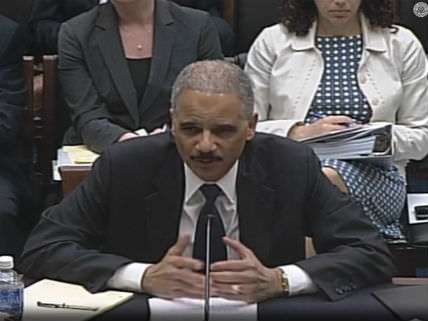Republicans Demand That the Feds Impose Pot Prohibition on States That Have Opted Out

Testifying before the House Judiciary Committee yesterday, Attorney General Eric Holder was grilled once again about his response to marijuana legalization in Colorado and Washington. He correctly responded that the Justice Department has "a vast amount of discretion" in deciding how to enforce the Controlled Substances Act and argued that his decision to focus on eight "federal enforcement priorities" in states that have legalized marijuana for medical or general use is "consistent with the aims of the statute." Rep. Jason Smith (R-Mo.) was not buying it. "Federal law takes precedence" over state law, Smith said. "The state of Colorado is undermining…federal law, correct? Why do you fail to enforce the laws of the land?"
This is the position that many Republicans, despite their supposed belief in federalism, have staked out with respect to the crumbling of pot prohibition. They not only accept the fanciful notion, which is no less absurd for having been endorsed by the Supreme Court, that interstate commerce includes marijuana that never crosses state lines, down to a plant in a cancer patient's yard or a bag of buds in her dresser drawer. They also argue, as Smith does, that "state law conflicts with federal law" if it does not punish everything that Congress decides to treat as a crime. Hence the feds must step into the gap, raiding and busting state-licensed marijuana growers and sellers. According to Smith (and Ted Cruz, among others), Holder is obligated to crush the experiments in Colorado and Washington.
Holder shares Smith's assumptions about federal power, but he argues that just because he has the legal authority to do something does not mean it's a good idea. He correctly notes that the Justice Department has never prosecuted every violation of the Controlled Substances Act. Not even close. Judging from survey data, more than 31 million Americans violated the federal ban on marijuana in 2012; 750,000 of them were arrested. That's less than 3 percent. The feds are responsible for about 1 percent of marijuana arrests, meaning they nab something like 0.02 percent of violators. Given its limited resources, the Justice Department, under both Republican and Democratic administrations, generally has eschewed small marijuana cases. Since the feds are responsible for 1 percent of marijuana arrests, what do gung-ho drug warriors like Smith think the Justice Department should do in states that decide they no longer want to be responsible for the other 99 percent? The department simply does not have the resources to pick up that kind of slack.
It's true that U.S. attorneys could send threatening letters to marijuana businesses and their landlords, which probably would be pretty effective at shutting them down. But then what? In Colorado, adults are allowed to grow up to six plants at home and share the produce, one ounce at a time, with friends, relatives, and acquaintances. Washington has hundreds of quasi-legal businesses that sell marijuana, ostensibly for medical use, which was authorized by a 1998 ballot initiative. The Justice Department can close state-licensed stores without too much effort, but the alternative sources will be much harder to control. That thought probably has occurred to Holder, who waited 10 months before settling on a less confrontational approach.
The memo that Deputy Attorney General James Cole issued on August 29 makes no promises, but it suggests that prosecuting state-legal cannabusinesses is not a good use of federal resources unless they are contributing to one of the eight problems listed in the memo, which include distribution to minors, sales of other drugs, interstate smuggling, violence, and organized crime. Holder is right that such prioritization is within his authority under the Controlled Substances Act, and Smith is wrong to suggest otherwise. Furthermore, this misguided argument in favor of imposing pot prohibition on recalcitrant states puts Republicans on the wrong side of history and the wrong side of their own avowed principles.


Show Comments (54)